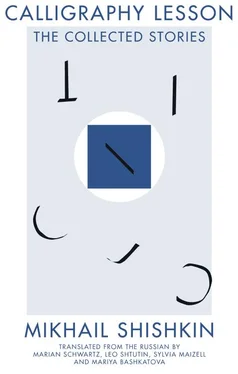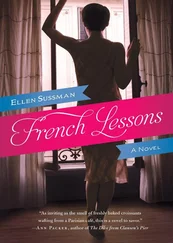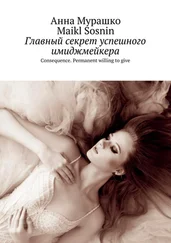Mikhail Shishkin - Calligraphy Lesson
Здесь есть возможность читать онлайн «Mikhail Shishkin - Calligraphy Lesson» весь текст электронной книги совершенно бесплатно (целиком полную версию без сокращений). В некоторых случаях можно слушать аудио, скачать через торрент в формате fb2 и присутствует краткое содержание. Город: Dallas, Год выпуска: 2015, ISBN: 2015, Издательство: Deep Vellum Publishing, Жанр: Современная проза, на английском языке. Описание произведения, (предисловие) а так же отзывы посетителей доступны на портале библиотеки ЛибКат.
- Название:Calligraphy Lesson
- Автор:
- Издательство:Deep Vellum Publishing
- Жанр:
- Год:2015
- Город:Dallas
- ISBN:978-1-941920-02-2
- Рейтинг книги:4 / 5. Голосов: 1
-
Избранное:Добавить в избранное
- Отзывы:
-
Ваша оценка:
- 80
- 1
- 2
- 3
- 4
- 5
Calligraphy Lesson: краткое содержание, описание и аннотация
Предлагаем к чтению аннотацию, описание, краткое содержание или предисловие (зависит от того, что написал сам автор книги «Calligraphy Lesson»). Если вы не нашли необходимую информацию о книге — напишите в комментариях, мы постараемся отыскать её.
Calligraphy Lesson — читать онлайн бесплатно полную книгу (весь текст) целиком
Ниже представлен текст книги, разбитый по страницам. Система сохранения места последней прочитанной страницы, позволяет с удобством читать онлайн бесплатно книгу «Calligraphy Lesson», без необходимости каждый раз заново искать на чём Вы остановились. Поставьте закладку, и сможете в любой момент перейти на страницу, на которой закончили чтение.
Интервал:
Закладка:
Now, no sooner have I written that I’d stopped talking to Mum than I sense that I’ve not written the whole truth, and have ended up lying as a result.
Yes, I never even said hello to her, but not only because I’d read The Kolyma Tales and The Gulag Archipelago , [5] Varlam Shalamov’s The Kolyma Tales (1978) and Solzhenitsyn’s Gulag Archipelago (1973) are classics of Gulag literature. —Trans.
which had inexplicably ended up in my possession around that time and changed much in my youthful conception of the world. Of course not. The conflict arose because of my first love. Mum didn’t like that girl. She didn’t like her at all.
At school she was the all-powerful headmistress, she could quell an inexperienced teacher’s unruly class with a single glance, but at home, in her relationship with her own son, she turned out to be completely helpless. Of course the mother wished her son well. But she didn’t know how to do him good. And of course Mum was totally right about that girl. But I realised that only later.
Disaster struck at Mum’s school when Andropov came to power. No one knew he was already mortally ill. Once again everyone got frightened of their own fear.
The seniors wanted to organise an evening dedicated to the memory of Vysotsky. Mum’s colleagues tried to dissuade her, but she authorized it. The evening went ahead. The kids sang his songs, recited his poems, listened to his recordings. Someone informed on the headmistress.
The school got an exemplary slap on the wrist to teach others a lesson.
I’d already moved out by then. I remember how I came home and Mum told me how she’d been summoned, boorishly spoken to, yelled at. She tried to defend herself, to explain. No one was going to listen to her.
She wanted to live out her life without losing human dignity. For that she got absolutely trampled.
For the first time, I think, Mum burst into tears in front of me. I didn’t know what to say, I just sat beside her and stroked her on the shoulder.
Suddenly I wanted to ask her forgiveness for not having spoken to her for almost a whole year, but I never did.
Mum got kicked out of work, a blow from which she would never recover. School was her whole life.
She fell seriously ill. First her heart. Then cancer. So began the hospitals, the operations.
By then I was working at a school myself, at the no. 444 on Pervomaiskaya Street, and after lessons I’d go and see her. I spent hours in the hospital ward, doing my marking, fetching Mum something to drink, giving her the bedpan, reading her the paper, cutting her nails, just being close by. It we spoke at all, it was of trivialities. Or rather, of what seemed important then, but now, so many years on, seems unimportant. I kept meaning to ask her forgiveness, but somehow I never managed to.
Later I described it all in The Taking of Izmail : her neighbour in the hospital who, bald from chemotherapy, never took off her beret, which made her look like a caricature of an artist; how bits of her nails, grown long on her gnarled toes, would fly all over the ward when I clumsily attempted to cut them; how I brought in some boards for her bed, because Mum couldn’t get to sleep on its caved-in wire frame.
The novel, written a few years after Mum’s death, took its rise from Russian literature, containing as it does many quotations, associations and interweaving plot threads, but by the end I was simply describing what was going on in my own life. From the complex to the simple. From the literary and the learned to Mum’s foam-filled bra, which she wore after they cut off her breasts. From Old-Slavonic centos to her quiet death, which she so longed for to release her from the pain.
There were a great many people at her funeral: teachers with whom she’d worked, former pupils. She’d accumulated a lot of pupils over the years. Only through your own life can you truly teach anything of any significance.
I was stunned to see her lying in the coffin with an Orthodox chaplet on her forehead. I don’t know where it came from, Mum was anything but a church person. She was a completely sincere non-believer. That’s how she’d been brought up. So when I was born she didn’t want me christened. And not because she feared repercussions—at the beginning of sixty-one, when Stalin still lay in the Mausoleum, she was the school’s Party organiser. She just genuinely couldn’t understand: what would be the point? Grandma had me christened on the sly at the church in Udelnaya, where we spent the summer at our dacha.
Even as a child, it was clear to me that church was a place for uneducated grannies, like my own, with three years of parochial school under her belt.
Later I thought that the old go to church because they fear death more than the young. And I didn’t yet know that, on the contrary, it is the young who have the greater fear.
It was only after Mum passed away that I sensed acutely how essential it is for close people to engage in one all-important conversation. Usually that conversation gets put off—it isn’t easy to start talking about the things that matter most over breakfast or somewhere in the metro. Something always gets in the way. I needed to ask Mum for forgiveness, but in all those years I never did manage to. When I began writing The Taking of Izmail , I thought it a novel about history, about the nation, about destiny, about the word, but it turned out to be that very conversation.
Most likely, such a conversation cannot take place during life in any case. It’s vital that it should come about, but what matter whether it happens before or after the end? The important thing is that she heard me and forgave me.
Between operations, during the time she had away from the hospitals, Mum would sort out her lifetime’s worth of photographs. She asked me to buy some albums and glued the photos into them, annotating each one with the names of the people it featured, and sometimes she’d write stories associated with these people into the margins. The result was a family archive—for the grandchildren.
After her death I took the albums over to mine. And when I was leaving for Switzerland, I left them all with my brother. The albums were stored in his house near Moscow.
The house was burnt down. All our photographs were destroyed.
All I have left is a handful of childhood snaps.
One of them, a picture of me, was taken, probably by my father, while we were still living in Presnia, though we moved to Matveyeskaya that same year. I’m in year four. I’m wearing an overcoat with a half-belt that’s out of the camera’s view. I remember that overcoat perfectly—it was a hand-me-down from my brother. I had to wear all his hand-me-downs. But here’s why the overcoat has stuck in my mind. Mum would often tell this story. It’s very short.
To get to school from Matveyevskaya we’d take the no. 77 bus to Dorogomilovskaya Street, where we changed to an Arbat-bound trolleybus, or alternatively we could take the same bus in the other direction to the railway station, and then on to Kievsky Station. That morning we went to the station. The first snow had fallen during the night. Thousands of feet had trampled the platform into a skating rink. When the train pulled in everyone dashed for the doors. You had to storm the already overflowing carriages, squeeze yourself into the jam-packed vestibules. Between the edge of the platform and the door was an enormous gap. I slipped and was about to fall headlong into it. Thankfully, Mum held me back by the half-belt.
That, essentially, is the whole story—nothing extraordinary. But this incident held such significance for Mum that she continued to recall it even on the eve of death. She’d smile and whisper just audibly—she’d lost her voice by then, and could only whisper:
Читать дальшеИнтервал:
Закладка:
Похожие книги на «Calligraphy Lesson»
Представляем Вашему вниманию похожие книги на «Calligraphy Lesson» списком для выбора. Мы отобрали схожую по названию и смыслу литературу в надежде предоставить читателям больше вариантов отыскать новые, интересные, ещё непрочитанные произведения.
Обсуждение, отзывы о книге «Calligraphy Lesson» и просто собственные мнения читателей. Оставьте ваши комментарии, напишите, что Вы думаете о произведении, его смысле или главных героях. Укажите что конкретно понравилось, а что нет, и почему Вы так считаете.












